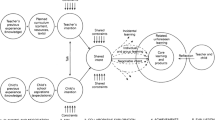Abstract
This article analyzes the common educational challenges faced by curriculum developers in the UK at the turn of the 21st century and the steps taken to address them by the Qualifications and Curriculum Authority in England and the Council for Curriculum Examinations and Assessment in Northern Ireland. The paper explores how the solutions emerging during the three curriculum review phases of 1998–1999 and 2005–2007 in England and 2000–2004 in Northern Ireland came about largely as a result of collegial working between the two bodies. As well as considering steps taken to develop aims that would drive curriculum change and a curriculum that would address the learning needs of students in the 21st century, the article also considers the lessons learnt about managing and supporting curriculum change. Developments in England and Northern Ireland serve to illustrate that an effective curriculum needs to: articulate clearly the key aims that will shape and drive it; be sufficiently visionary and flexible to allow teachers to respond to the needs of students now and in the future; and provide on-going support to help embed and sustain change. The three are inter-related and successful curriculum development involves considering them together.
Similar content being viewed by others
Notes
The Dearing review was so called after Sir Ron Dearing who was appointed to lead it.
The Key Stages were first defined in the 1988 Education Reform Act to accompany the first introduction of the National Curriculum. They cover a certain age range and imply specific learning outcomes expected from students. Four such key-stages are defined legally (Key Stage 1: Years 1 to 2, 5–7 years old; Key Stage 2: Years 3 to 6, 7 to 11 years old; Key Stage 3: Years 7 to 9, 11–14 years old; Key Stage 4: Years 10 and 11, 14–16 years old) while two have no legal definition (Key Stage 0: Nursery and reception years, 3–5 years old; and Key Stage 5/Sixth Form: Years 12 to 13 (16–18 years old).
The new Labour initiatives included: the development of an early years’ framework for pre-school education; the introduction of literacy and mathematics strategies in primary schools; the promotion of citizenship education; and a review of qualification arrangements post 16.
The INCA database with information on curriculum and assessment in 22 countries can be found at www.inca.org.uk.
The outcomes of these investigations can be found under thematic studies on the INCA website at www.inca.org.uk/thematic_probes.html.
The division of compulsory education into four key stages related to pupils’ ages (5–7, 7–11, 11–14, 14–16) was retained and, knowledge, skills and understanding continued to be set out under subject headings and organized in separate programmes of study for each key stage. In each subject, attainment targets continued to set out progressive levels of attainment on a single scale across the key stages.
A framework for personal, learning and thinking skills is arranged under the six headings of independent enquirers, creative thinkers, team workers, self-managers, effective participators and reflective learners.
Introduced in 2004, Every Child Matters is an initiative to bring greater coherence across children’s services by providing a set of five common aims that mattered most to children by helping them to be healthy, stay safe, enjoy and achieve, make a positive contribution and achieve economic well-being.
In the previous curriculum these existed as separate frameworks and schools were left to sort out the relationship between them, often with little success.
In 2000 the online curriculum was developed as an additional resource for schools. It was exploring the potential, but most teachers continued to rely on the printed documents that had been sent to schools in sufficient numbers that each teacher had a copy.
References
Assessment Reform Group. (2005). Research papers and publications. See:arg.educ.cam.ac.uk/publications.html.
Earl, L., Watson, N., & Katz, S. (2003). Large-scale education reform: Life cycles and implications for sustainability. Reading. CfBT.
England. Department for Education, Employment (DfEE) and Qualifications and Curriculum Authority (QCA). (1999). The national curriculum, handbook for teachers (pp. 10–13). London: HMSO.
England. Department for Education and Skills (DfES). (2000). Schemes of work. London. See http://www.standards.dfes.gov.uk/schemes3/.
England. QCA. (2000). The revised national curriculum. London. See http://www.qca.org.uk/qca_13575.aspx or http://www.nc.uk.net.
England. QCA. (2004). The futures website. London. See http://www.qca.org.uk/qca_6073.aspx.
England. QCA. (2007a). The new secondary curriculum. London. See http://curriculum.qca.org.uk/aims/index.aspx.
England. QCA. (2007b). A big picture of curriculum. London. See http://curriculum.qca.org.uk/key-stages-3-and-4/organising-your-curriculum/principles_of_curriculum_design/bigpicture.aspx
Harland, J., et al. (2002). Is the curriculum working? London: NFER.
Le Metais, J. (1997). Values and aims in curriculum frameworks. See www.inca.org.uk/pdf/values_no_intro_97.pdf.
Northern Ireland. CCEA. (1999). Key messages from the Curriculum 21 conferences and the curriculum monitoring programme. Belfast.
Northern Ireland. CCEA. (2003). “Pathways”, proposals for curriculum and assessment at key stage 3. Belfast, See www.ccea.org.uk (choose “Teachers” and select “Curriculum Review”).
Northern Ireland. CCEA. (2007). The new Northern Ireland Curriculum website. See www.nicurriculum.org.uk For Thematic units, see www.nicurriculum.org.uk/connected_learning/thematic_units/.
Tunstall, P., et al. (2001). Schools’ aims and values. A case study investigation for QCA. London: QCA.
White, J. (2004). Rethinking the school curriculum. Values, aims and purposes. London: Routledge Falmer.
Author information
Authors and Affiliations
Corresponding author
Additional information
Original language: English.
About this article
Cite this article
Colwill, I., Gallagher, C. Developing a curriculum for the twenty-first century: the experiences of England and Northern Ireland. Prospects 37, 411–425 (2007). https://doi.org/10.1007/s11125-008-9044-3
Published:
Issue Date:
DOI: https://doi.org/10.1007/s11125-008-9044-3




